Julia Blu-ray Movie
HomeJulia Blu-ray Movie 
Limited EditionTwilight Time | 1977 | 117 min | Rated PG | Apr 12, 2016
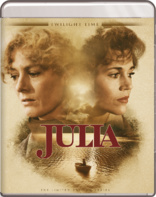
Movie rating
7 | / 10 |
Blu-ray rating
| Users | 0.0 | |
| Reviewer | 4.0 | |
| Overall | 4.0 |
Overview
Julia (1977)
Born to great wealth, the fiercely independent Julia devotes her life to political causes, fighting fascism in the 1930s. While traveling in Europe, Lillian Hellman, a dear friend to Julia, is approached by one of Julia's political acquaintances and is swept into a dangerous world, smuggling money across hostile borders.
Starring: Jane Fonda, Vanessa Redgrave, Jason Robards, Meryl Streep, Rosemary MurphyDirector: Fred Zinnemann
| Thriller | Uncertain |
| Drama | Uncertain |
Specifications
Video
Video codec: MPEG-4 AVC
Video resolution: 1080p
Aspect ratio: 1.85:1
Original aspect ratio: 1.85:1
Audio
English: DTS-HD Master Audio Mono (48kHz, 24-bit)
Music: DTS-HD Master Audio 2.0 (48kHz, 24-bit)
Subtitles
English SDH
Discs
50GB Blu-ray Disc
Single disc (1 BD)
Playback
Region free
Review
Rating summary
| Movie | 4.0 | |
| Video | 4.5 | |
| Audio | 4.0 | |
| Extras | 2.0 | |
| Overall | 4.0 |
Julia Blu-ray Movie Review
Reviewed by Jeffrey Kauffman May 5, 2016Zionist hoodlums.
For some film aficionados, it’s that brief but shocking description which will forever be linked to Julia, for better or worse, an ironic
epitaph of sorts to what was otherwise a celebratory romp for a film which perhaps unexpectedly caught not just the favor of critics, but a
large swath of the film going public, who turned it into one of 1977’s biggest cinematic hits. The film received 11 Academy Award
nominations, tying with The Turning Point for the most
nominations that year (besting a little film called Star Wars, which received a “mere” ten nominations). Julia ultimately walked away with three trophies for
Alvin
Sargent (Best Adapted Screenplay), Jason Robards (Best Supporting Actor) and the controversial Vanessa Redgrave (Best Supporting
Actress), whose acceptance speech contained the above quote and whose comments caused a chill in an audience comprised at least
substantially by Jewish Americans who reacted with loud “boo”’s and other signs of censure. One of those Jewish Americans, the legendary
screenwriter Paddy Chayefsky, took Redgrave to task when he presented an award later in the evening, scolding the actress and with
typically dry but pointed Chayefskian humor letting her know that her win was not an epochal moment in history requiring a political
statement. It all tended to leave a bad taste in the mouths of folks on both sides of the so-called “two state solution”, and perhaps
unfortunately colored how Julia has been seen in the overall context of American film. What’s so ironic about all of this is, and
something that Redgrave perhaps inartfully attempted to address in her contentious acceptance speech, is that Julia’s subtext is all
about anti-Semitism and the fight against Nazism.
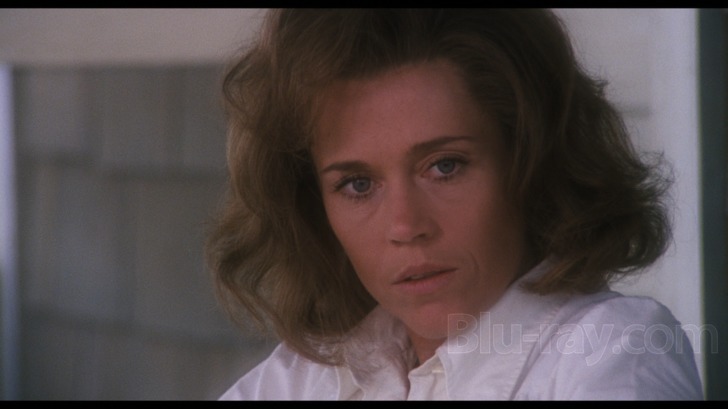
There’s an undeniably elegiac quality to Julia, but as evidenced by some interesting admissions in Jane Fonda’s fascinating commentary, like a eulogy that perhaps stretches the truth to give the deceased a stellar send off, the story told in Julia probably never happened at all, at least not how it’s depicted as unfolding in the film. Based on Lillian Hellman’s memoir Pentimento, Julia supposedly weaves a “true life” tale of lifelong friends Lillian (played by Jane Fonda as an adult) and Julia (played by Vanessa Redgrave as an adult). The film dabbles in flashbacks which establish vignettes of the characters as youngsters and then young women.
Julia’s freewheeling proclivities become more apparent as she begins her college studies, while Lillian, no shrinking violet, at least seems more consigned (or maybe resigned) to “playing the game” in order to further her career as a writer. As such, she becomes involved in a sometimes tumultuous relationship with the legendary Dashiell Hammett (Jason Robards). While some of this material tends to tilt precariously toward soap operatic tendencies, the film ultimately gets into more of a suspense ambience during the World War II era, when Julia’s political activism lures Lillian into some risky behavior trying to get funds smuggled into Nazi Germany in order to aid anti-Nazi sympathizers. What’s a bit odd about Alvin Sargent’s adapted screenplay is that it largely eschews getting into the fact that Hellman was Jewish, something that in and of itself made her a “suspicious character” in the Germany of the day, even putting aside her supposed subterfuges.
The film is an actor’s showcase, and aside from Oscar winners Robards and Redgrave, Julia also netted Academy Award nominations for Fonda herself, as well as Maximilian Schell, who competed against Robards for the Best Supporting Actor statuette. Beautifully directed by Fred Zinnemann (replacing Nicolas Roeg, of all people, at least according to Fonda’s commentary), the film is a character study which hints at suspense tropes, probably delivering more consistently on the first score than the second.
In a way, Julia presages later efforts like Schindler's List, at least in detailing the heroic efforts of some who sought to help those in peril. What’s a bit discomfiting about all of this, though, is the fact that Hellman may well have made it all up, or at least appropriated other people’s stories to make them seem like they were her own. While the “Zionist hoodlums” comment stands as a branding of sorts that Julia has never been able to escape, there’s even more “backstage” drama underlying this film that enterprising investigators may want to look into, including some extremely juicy tidbits courtesy of a lawsuit which Hellman brought against her longtime adversary Mary McCarthy, who claimed “every word” Hellman ever emitted was a lie. This opinion was no secret even at the time Julia was being filmed, as the Fonda commentary touches on. If truth is stranger than fiction, it’s debatable how strange “fictionalized truth” might be.
Julia Blu-ray Movie, Video Quality 
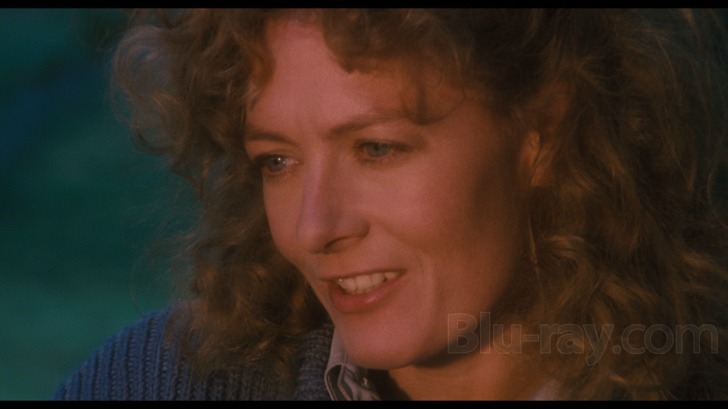
Julia is presented on Blu-ray with an AVC encoded 1080p transfer in 1.85:1. Photographed by the legendary Douglas Slocombe (who was deservedly Oscar nominated for his efforts), Julia has an intentionally gauzy, soft focus look which some may infer is a "squishy" looking transfer, which is not the case. From the first moments showing Hellman in a boat on a misty river, through several scenic locales both at Hellman's beach house as well as interstitial elements that are literally global in scope, Slocombe tends to offer effulgent lighting sources which cast evocative glows on several long sequences. The palette is intentionally tamped down a lot of the time, favoring darker browns and blander tones like beiges, which only tends to make brief moments like a train traveling toward an awesomely pink and purple sunset all the more vivid. Detail levels remain high throughout the presentation, with elements like the tufted pill on the "none too subtle" (to quote Fonda) hat Hellman sequesters some money in popping quite nicely. A few dark scenes, including a nighttime beachside sequence, don't offer a lot in the way of shadow detail. Grain is natural looking and there are no overly problematic signs of wear or tear.
Julia Blu-ray Movie, Audio Quality 
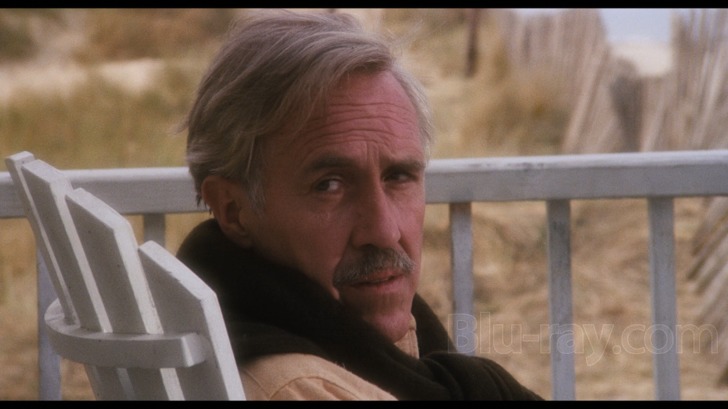
Julia offers a fine sounding DTS-HD Master Audio Mono track, one which more than capably supports the film's dialogue and lovely Oscar nominated score by Georges Delerue. Ambient environmental effects are lifelike and the track has no problems in terms of damage or prioritization.
Julia Blu-ray Movie, Special Features and Extras 
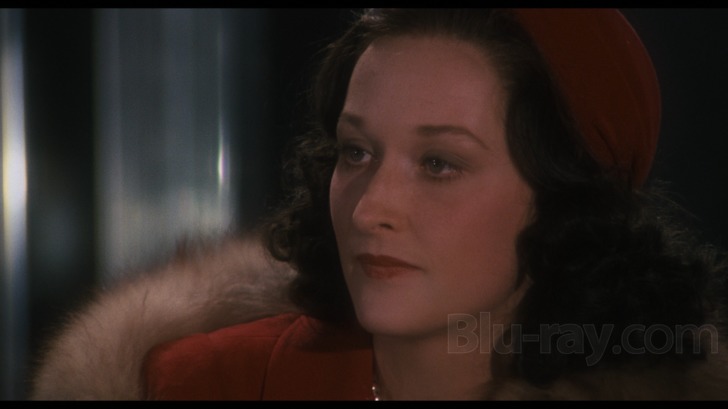
- Audio Commentary features Jane Fonda and Twilight Time's Nick Redman.
- Original Theatrical Trailer (480i; 2:42)
- Isolated Score Track is presented in DTS-HD Master Audio 2.0 and contains some effects.
Julia Blu-ray Movie, Overall Score and Recommendation 
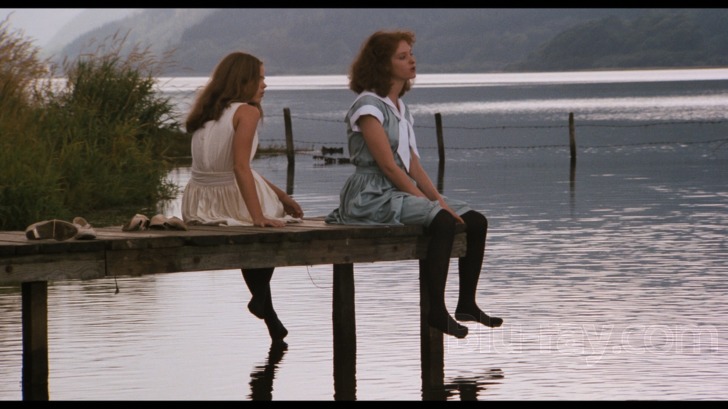
Julia is an intelligent character study that probably ambles a bit too much for its own good, but which still provides incredible opportunities for a large and varied cast (including Meryl Streep in her first featured film role). The film stumbles a bit in the narrative department, but the performances elevate this film to a level that its occasional faltering might have otherwise prevented. Gorgeously lensed by Douglas Slocombe, Julia's reach may exceed its grasp, and it may have a tenuous (at best) connection to "the truth", but it's still a moving and remarkable film. Technical merits are first rate, the Fonda commentary is consistently interesting, and Julia comes Highly recommended.
Similar titles
Similar titles you might also like

Woman in Gold
2015

Midnight Sun
2018

Charlotte Gray
2001

The Nun's Story
Warner Archive Collection
1959

Adore
Perfect Mothers
2013

The Mortal Storm
Warner Archive Collection
1940

The Life and Death of Colonel Blimp
1943

If Beale Street Could Talk
2018

Won't Back Down
2012

Paradise
1991

Sophie's Choice
Collector's Edition
1982

Wild River
Fox Studio Classics
1960

The Clock
Warner Archive Collection
1945

Snow Falling on Cedars
Collector's Edition
1999

The Way We Were 4K
50th Anniversary
1973

Waiting for Forever
2011

The Longest Ride
2015

The Kite Runner
2007

Divine Secrets of the Ya-Ya Sisterhood
2002

Swing Shift
1984